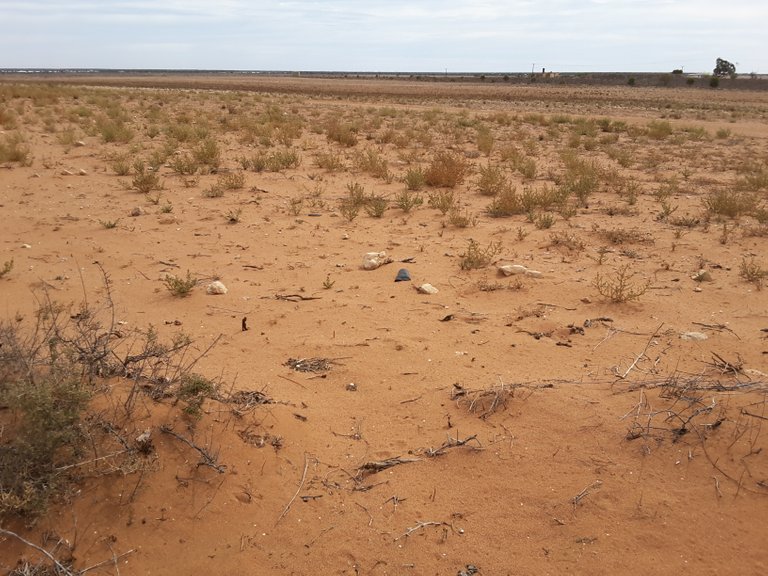All Things Are Connected.
For thousands of years people have talked about how everything is connected. Often they couldn't explain how, but they'd often explain why with the idea of spirits. A village might start to experience unexplained illness and the medicine man/woman might say that the spirits were angered because they harmed the forest when they took more trees than they needed. In our modern world where we have so much more scientific knowledge about these things, we find this laughable, yet as science learns more and delves deeper into things, we are realising that the connections really are there, after all, and what happens in one place can have knock on affects in another.
If I were to tell you that the Amazon Rainforest is an integral part of the process which produces the world's oxygen, you'd likely believe me, but what if I told you that the vast, desert, salt plains of Africa are also an integral part of the process which produces the world's oxygen? You'd probably say, “my dear, a desert is lifeless and doesn't produce oxygen,” or something to that effect. Well of course it doesn't, but what if I also told you that none of the oxygen the Amazon produces makes it far past it's own edges? It's so full of life that it's inhabitants make full use of the amount produced there. That's not to say that no oxygen comes in our out of it, it's just that it doesn't add any excess to what is used by the ecosystem there. So how come it's called the lungs of the planet?
Let me tell you a story…
On the salt plains of Africa, men toil in the unforgiving sun. In the heat of the day, they chisel out blocks of salt and load them onto camels. Once the camels are fully loaded, it's time to head home where their burdens can be offloaded and sold. As they trek homeward across the desert a towering, brown wall is chasing them down. They wrap their faces, covering their mouths and noses to keep out the dust from that storm they know is coming. Soon, the wall engulfs them in its swirling mass of sand and grit, winds whipping their clothes as they forge on forwards, steadfast in their direction.

Not Africa, but a deserty kind of picture to get the feeling.
They are but ants in a vast dust storm, covering hundreds of miles of desert. The powerful winds whip the dust higher and higher into the atmosphere, where it joins global currents moving westwards. Over the next few days the brown cloud travels across the ocean to South America. There it meets the almost constant clouds of the Amazon Rainforest and as they join it comes down as a nutrient rich rain which nourishes the abundant plant life.
A huge river runs along the jungle floor, but an even bigger one runs above the canopy. This rainforest sends even more water up into the air than runs in the mighty Amazon and this river in the sky runs westward until it reaches the wall that is the Andes. There it comes back to the earth as rain, filling rivers which erode the face of the mountains and carry the rock particles to the sea. There diatoms feast on this silica rich bounty.
This single celled algae encases itself in a silica shell and blooms can be seen from space. They provide 50% of the oxygen on the planet and when they die their skeletal remains fall like snow, piling up on the ocean floor, year after year. As millennia pass, continents move and sea floor becomes land; a salty sandy desert where dust storms kick up vast brown clouds and all things connect.
Of course the coast of South America isn't the only place where diatom blooms occur, but this is a good illustration of how natural cycles connect across the world and through time. As we continue to pollute and damage ecosystems what effects could this already be having? If only one thing disappears, then a cycle is broken and the consequences could be devastating.
More interesting reading on diatoms can be found here.
To listen to the audio version of this article click on the play image.

Brought to you by @tts. If you find it useful please consider upvoting this reply.
I thoroughly enjoyed reading this. Its the sort of thing that should be published widely, to let people know that we can't keep literally killing the fine balance of our eco-systems.
Thank you for saying so, I'm glad it was an enjoyable read.
I’m starting to think that most people are brimming aware that the damage being caused to our ecosystems is not a good thing, but they don't even know if they have any control to be able to do something about it. Many of our biggest and most important ecosystems are in poorer countries being exploited by companies in richer countries.
Posted using Partiko Android
I saw this I think on Netflix recently? They were talking about diatoms, and the way the clouds over the Amazon contain more water than the Amazon itself. Fascinating.
Yes, Will Smith, One Strange Rock. Fascinating stuff.
Posted using Partiko Android
Here's a strange rock formation.
 https://pbs.twimg.com/media/DFmj1OtXcAM-Ul9?format=jpg&name=small
https://pbs.twimg.com/media/DFmj1OtXcAM-Ul9?format=jpg&name=small
Oh dear, it's official. You've reached the dad joke domain! 😂
Posted using Partiko Android
I homeschool my 8 year old and we have been watching this show One Strange Rock. We both LOVE it! This is an awesome post. I'll have to read it to my daughter. Thanks for sharing!!
I was also watching it with my homeschooled daughter! We've only watched a couple of episodes so far.
Posted using Partiko Android
Well hello fellow homeschooler! :)
Posted using Partiko Android
Wow, I didn't realize there was more water in the clouds than in the Amazon itself. But that makes sense.
Posted using Partiko Android
That was a lovely bit of stepping back and seeing the world differently, with new and fresh eyes. Lovely! And yes, the ways we are connected are too incredible and too intricate to even trace.
Leading the curation trail for both @ecotrain & @eco-alex.
Together We’re Making This World A Better Place.
Click Here To Join the manually curated trail "@artemislives" to support quality eco-green content.
@ecoTrain
Thank-you for the biology lesson, something I was not aware of!
Thank-you for the heads up on the interconnectedness of all things in the ecosystem and how devastating it could be if you take one part out of the equation!
I love our planet earth and the abundance it provides and hope more people will wake up and realize that it can't continue to provide if we continue to destroy it!
We're taking a lot of things out of the equations, aren't we, and we will ultimately pay the price, along with a lot of other species. Nature will balance things back out, one way or another, but we might not exist to see it.
Makes you feel sad.
Posted using Partiko Android
How true and sad indeed!